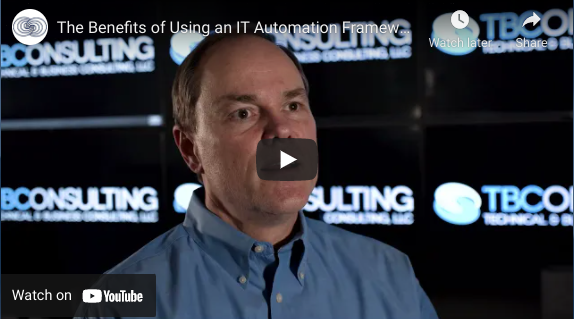
Automation sounds fun and easy. Like you are saving time and being on-trend too! Maybe you wish you could automate more things in your life, like dog walking, social event planning, and car maintenance? But the important factor that prevents automation from controlling more things, is that automation can’t account for differences/unexpected incoming data. What if your dog breaks the leash? Your friends are sick? Your car gets a flat? Automation isn’t flexible enough to compensate for all variations of an event – especially in an IT environment. Human intellect and participation are still essential to implementing and maintaining an IT automation framework.
While automation plays a big part in IT by taking over repetitive tasks – saving time and resources - automation doesn’t mean zero-touch. Building a comprehensive automation framework requires IT, engineers and architects, with experience and talent to understand the intricacies of each environment, evaluate systems and alerts, and map the behavior pattern of incidents.
In addition, not everything in your environment should be automated, even if it could be automated. Many firms rely too heavily on automation, which can cause IT, teams, to miss threats, resulting in data breaches and huge gaps in response times. Take a good look at your cybersecurity automation. Firewalls are your first line of defense against an estimated 119,000 cybersecurity threats per minute, but many organizations fail to configure and update Access Control Lists, leaving their networks vulnerable and allowing unrestricted traffic. The automation tool is there, but the human factor is needed to protect your edge.
Listen to what Dieter Gable, CEO of TBConsulting, has to say about the benefits of implementing an IT automation framework across your organization.
As long as you heed Dieter’s warnings, automation can prove beneficial to your business. Automation can be used to reduce costs across your enterprise – in cybersecurity, networks, infrastructure, cloud computing, and data analytics.
Organizations that carefully implement and maintain IT automation frameworks across their systems can enjoy the following benefits of automation:
- Reduced complexity of your IT environment
- Allow your security team to focus on real, credible threats instead of false positives
- Engage IT specialists to address strategic problems, rather than mundane tasks
- Compel your company to define processes and build requirements for your environment
- Visualized value of tool integration, proper configuration, and response sequencing
- Increased efficiency and productivity
“The first rule of any technology used in a business is that automation applied to an efficient operation will magnify the efficiency. The second is that automation applied to an inefficient operation will magnify the inefficiency.” – Bill Gates
Automation frameworks are an important component of an organization’s IT structure, but automation needs to complement the people, the processes, and the technologies that are already functioning together to build business outcomes. While AI and machine learning are propelling technological change at a tremendous rate, the difficulty lies in integrating all the new tools to produce the results you want. Automation may improve your organization’s resilience, improve efficiency, and boost production, but if not implemented correctly and constantly maintained, automation may expose your organization to serious security risks. Automation is a right place, right time, right reason kind of tool. TBConsulting, a trusted Managed Service Provider with 25 years of business and IT experience, can help support your automation journey to help you avoid magnifying any errors in your processes. Contact us today to speak with one of our IT experts.
.png)



